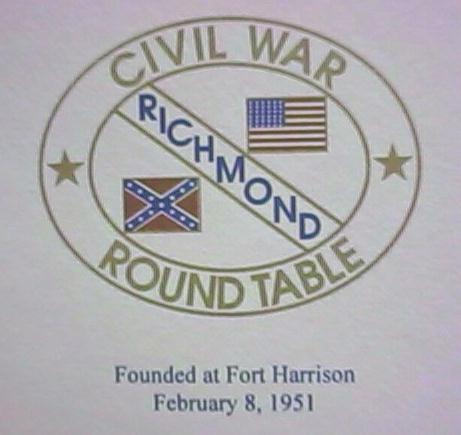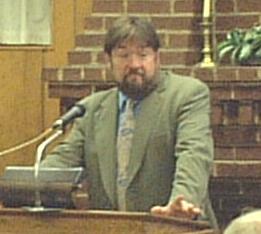


November 2003
rcwrt.org
Brag Bowling, President Rob Monroe, Editor 3019 Kensington Ave 2416 Edenbrook Dr. Richmond, VA 23221 Richmond, VA 23228-3040
November 2003 PROGRAM Robert K. Krick "The Confederate Pattons" 8:00 p.m., Tuesday, November 11, 2003, at the Willow Oaks Country Club, 6228 Forest Hill Ave. Robert K. Krick grew up in Northern California. He has lived and worked on east coast battlefields for more than thirty-five years. For thirty years he was Chief Historian of Fredericksburg & Spotsylvania National Military Park. Krick is the author of fourteen books and more than one hundred published articles. His Stonewall Jackson at Cedar Mountain (University of North Carolina Press, 1990) won three national awards, including the Douglas Southall Freeman Prize for Best Book in Southern History. Krick's Conquering the Valley: Stonewall Jackson at Port Republic (William Morrow & Co., 1996) was a main selection of the History Book Club and a selection of the Book of the Month Club. His latest book, from Louisiana State University Press (Feb. 2002), is The Smoothbore Volley That Doomed the Confederacy: The Death of Stonewall Jackson and Other Chapters on the Army of Northern Virginia. Krick is currently under contract to the United States Marine Corps to produce panels and texts and captions for the mammoth new National Museum of the Marine Corps that is under design near Quantico. Krick's topic is the fertile and militant Patton family of Fredericksburg, Culpeper, and Richmond. The family contributed several distinguished officers to the Army of Northern Virginia, including the grandfather and several great uncles of the renowned World War II Patton.
Review of the October Program
 |
Upcomming Events
November 15-16 Capital of the Confederacy Civil War Show at the Richmond Raceway Complex, 600 E. Laburnum Ave. Civil War artifacts for sale, educational exhibits. 9 am - 5 pm Saturday, 9:30 am - 3 pm Sunday. $5. More information at 804-798-6817 or capconcwshow@yahoo.com November 22 "Blue and Gray Ball" at Fauquier Springs Country Club in Warrenton. Civil War period clothing or black-tie. Fundraiser for the John Singleton Mosby Museum. 5:30 pm - midnight. $90 includes formal dinner. More information at 540-351-1600 or www.mosbymuseum.org November 27-30 "Thanksgiving" living history at Pamplin Historical Park and the National Museum of the Civil War Soldier near Petersburg. Features artillery demonstrations, food preparations and the construction of winter huts with the soldiers. More information at 1-877-PAMPLIN or www.pamplinpark.org December 6 "Visit with Civil War Santa" at Pamplin Historical Park and the National Museum of the Civil War Soldier near Petersburg. Living history and a holiday sale at the Civil War Store. More information at 1-877-PAMPLIN or www.pamplinpark.org December 7 Christmas Open House and living history at the Miller-Kite House, Stonewall Jackson's headquarters, in Elkton. Noon - 5 pm. Donations are appreciated. More information at 540-298-1717 or 540-298-5390. December 8 Holiday Music Program at Old Salem Church off Route 3 west of Fredericksburg. 7 pm. More information at 540-373-6122 or www.nps.gov/frsp
Positions Announced for 2004 Round Table
President - Art Bergeron First Vice President - Richard Forrester Second Vice President - Shep Parsons Secretary - Sandy Parker Treasurer - Richard Grosse Web Master - Gary Cowardin Executive Committee - Jack Ackerly, Bobby Krick, Sam Craghead
New Civil War Books
Some recent additions to Civil War literature: In the Presence of Mine Enemies: War in the Heart of America, 1859-1863 by Edward Ayres. An intimate look at two communities (Augusta County, Va. and Franklin County, Pa.) and how they initially sought to avoid war, but soon entered the conflict with vigor. Southern Lady, Yankee Spy: The True Story of Elizabeth Van Lew, a Union Agent in the Heart of the Confederacy by Elizabeth R. Varon. A comprehensive account of the Union sympathizer contemporary Richmonders dubbed "Crazy Bet". Vicksburg is the Key: The Struggle for the Mississippi River by William L. Shea and Terrence J. Winschel. A narrative of the Union campaigns that secured the river and Confederate strategies to break the siege.
Newsletter Deadlines To facilitate the printing and timely distribution of the monthly newsletter, information for it should be submitted to the editors no later than the following dates: December newsletter, November 21 Information may be emailed to rmonroe@richmond.com
RCWRT Monthly Speakers for 2003
Richmond Civil War Round Table Newsletter Rob Monroe, Editor 2416 Edenbrook Dr. Richmond, VA 23228-3040
Return to News Letters Index
Return to main page

©R.C.W.R.T. 2003